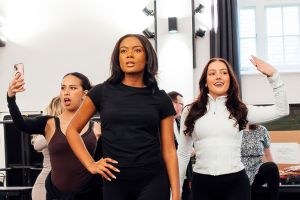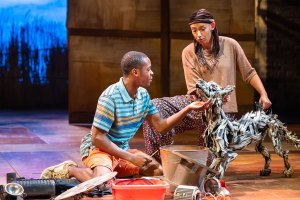Timothy West & Full Cast Collection at WOS Q&A
Theatregoers at our Whatsonstage.com Outing to The Lover/The Collection at the West End’s Comedy Theatre last night (25 February 2008) were treated to an exclusive post-show question and answer session.
All four cast members attended the Q&A which was held in the Comedy Theatre following last night’s performance of the Harold Pinter double bill. Gina McKee, Timothy West, Richard Coyle and Charlie Cox addressed issues ranging from tackling a Pinter pause to cutting themselves on the bongos.
The double bill features two of Nobel Prize winner Harold Pinter’s dark and funny plays, The Lover and The Collection. The Lover was originally written by Pinter as a television play and was broadcast in 1963. Later in the same year it appeared on stage in a production that was directed by the author. The Collection is a one act play from the early sixties which follows the comings and goings of four city dwellers as they build relationships and try to establish what happened one memorable night in Leeds.
Monday’s post-show discussion at The Lover/The Collection was chaired by What’s On Stage magazine editor Roger Foss. For more photos and feedback, visit our Outings Blog and for details of upcoming events, click here. Edited highlights from the Q&A follow …
On finding the comedy in a Pinter play
Timothy West: You just try and perform the script correctly and it is funny when it’s meant to be. If the author’s intention is that the audience should laugh then they will laugh if you get it right. If it’s their intention that you should feel sad or disgusted or frightened and you get it right they will feel that as well. There is no difference really.
Richard Coyle: Even the table rattling is in the script. We didn’t make that up.
Charlie Cox: It was great for us because Harold was involved in the production all the way along and he came in and said ‘just enjoy it’. For a while we were playing it too seriously. I was playing it like Basil Fawlty or something. He told us just to play the comedy. That was a kind of green light for me. You are in awe of the play in a way, but when he said that it just opened it up for me. What I’ve noticed is that if there are not a lot of people in the house the audience tend to come in on the back foot slightly. Because it is Pinter and it is uncomfortable to watch, people don’t want to laugh at the wrong moments and I feel like the audience are aware of that. I felt the same way in the read through, I was aware of where I was laughing. You don’t want to laugh if no one else laughed. On the other hand, if we have a full audience then people come in less on the back foot, more relaxed. The first potential joke is cracked and somebody laughs and that gradually builds and by the end of the play people are really laughing. I felt tonight like people were really laughing. Sometimes something has got a laugh every single night and then suddenly for some reason it is delivered in the same way and the audience are silent.
On Harold Pinter
Cox: Pinter was there on the first day for the read through. He has worked with Jamie Lloyd, our director, before and he came in and out a couple of times, for various dress rehearsals and that kind of thing. He came to see us on Saturday and took us to dinner which was nice. I’m a Pinter virgin. I’m a play virgin actually, this is my first play.
West: I think Pinter is so popular because his writing is much more akin to our normal experience than a conventional play. With Pinter we walk into a room and see two people arguing. We don’t know who they are, we don’t know what they are doing, we don’t know what they are arguing about. Pinter is saying ‘this is our life, this is how I am going to show you it on the stage.’ A conventional play write won’t show you two people on the stage having an argument until they have told you something about them either in the programme or in the preceding scene. Pinter doesn’t do that, he just says here are two chaps and they are talking and they are getting quite excited, find out for youself, you are an eavesdropper. I think that is fascinating. People talk about the mystery of Pinter but his work is actually much more like real life than most.
Cox: I feel like he has written a three hour play and we just perform one hour of it.
Gina McKee: There is often a sort of impeccable quality to Pinter’s construction. Nothing is wasted, everything is important.
West: The doubt Pinter leaves is important. If we don’t understand something we feel anxious. That is what Pinter is selling, he is selling anxiety and it is very attractive.
On Pinter’s infamous scripted pauses
West: They are a load of rubbish. I think at one time Pinter must have been working with some actors who didn’t pause to think and make sense of the play. There is no such thing as a pause for pauses sake is there? You pause because perhaps you were going to say something and you think better of it, or perhaps you thought someone else was going to say something and they don’t. It is just reminding you that that kind of thing happens in a conversation but you don’t have to be reverent about it.
Coyle: I think Pinter himself has been slightly bemused by the way the pause thing took off. It has just grown. He said something really interesting about the pauses, he said the reason that he put them in in the first place was because he was an actor first and foremost and he played in weekly rep. You would have to learn a play and perform it within a week and the next week you would go on to the next play. He said part of the reason he put the pauses in was to signify where you change thought to actors who hadn’t had a lot of rehearsal.
On the rehearsal process
Coyle: The Lover is quite an intimidating play when you look at it on the page. I got through the whole play by just taking it bit by bit. As you went further into it it seemed to be less and less intimidating.
West: I think you have to make up your mind what your mood is for each scene and govern the words that you have been given to say by that mood. Quite rightly Pinter doesn’t write people who say what they mean or mean what they say.
Cox: I am still finding my way in the play in many ways. It changes every night. Richard helped me a lot with that. It has to change a little bit in order to keep it any way real. That is the real challenge with doing this over doing any film or TV stuff. Without changing the direction in any way there has to be some slightly different tensions here and there.
West: It does have to be new every night. Everything has to happen as if it is happening for the first time. That is the difficulty with long runs of course.
On what happened in Leeds
Coyle: We don’t know what happened in Leeds.
West: We talked about it over the meal. We still don’t know.
Coyle: That is the whole point for my character, I don’t know what happened in Leeds. I think there are several different versions of what might have happened. I don’t want to know. I think confused is where I need to be.
Cox: We don’t know what Pinter’s construct of what happened in Leeds is. He won’t tell us. That is the question he has been asked most in his whole career. What happened in Leeds? He never answers.
On favorite Pinter plays
West: The Homecoming. I just think it is his best actually. It is a remarkable play and every single production of it I have ever seen or indeed been in has been different. The director has taken a slightly different angle on it and it has produced new things. It’s like Shakespeare really, the more times you do it the more things you find out that you had never thought of before. I think it is a very remarkable play.
Cox: The Birthday Party. It is the only other one I have read.
Coyle: The Dumb Waiter probably. It was the first one I had ever read and also I was involved in a very bad production if it.
McKee: I studied The Homecoming when I was a student. I feel I can visit it again and again and I will always get something from it. From an actor’s point of view I actually think The Lover is good because it is so complete and sound on its own, it is quite remarkable really. It is wonderful to do as an actor. I do rather like Betrayal as an actor as well. I think what is interesting about Betrayal is that it represents a change or a development in Harold’s work.
On performing these plays in the 21st Century
McKee: Both plays were written in the sixties and are clearly set in that era. I think it would be quite difficult to update them. Although there are ever lasting themes I think our attitudes have changed. I just think it wouldn’t work. Inevitably you end up judging it a little from a modern woman’s sensibility. But I think you must also put that aside and look at the time it was set in. You must consider what women had at that time and what was beginning to develop and you have to take it from that point of view. You have to put aside the advances, minimal though they are, that we have made. I think one of the points of The Lover which is really important is that what you witness is incredibly private. It is very private and I think that is what gives it a currency that we all enjoy and hate and find difficult.
West: I don’t think it is saying anything about society or that this scenario is typical. It is just a private look at two people who happen to do that.
On the role of the female in The Collection
McKee: I am not sure that she is in control I think she is extremely lonely and on her own. I think the way Harold related to women at that time is interesting. He celebrated women but kind of put them on a pedestal. I think there is a lot of appreciation but not wholly understanding. I think there is a similar thing with the females in The Homecoming, there is an enigmatic quality and that is very powerful but it is never spelt out.
On the bongo drums
McKee: We had another bongo drum but we kept cutting our hands. We got ripped to shreds so they gave us this one which has been smoothed down at the edges. We have had more problems with the cheese knife. They took the edge of it so it is not so sharp.
Cox: That is when you know it was written for television, when you have got a character throwing a cheese knife at another character and the next line is ‘good catch’.
– by Kate Jackson












